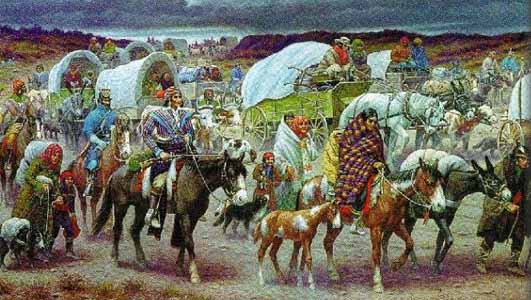"Say to the chiefs and warriors that I am their friend, that I wish to act as their friend but they must, by removing from the limits of the State of Mississippi and Alabama and by being settled on the lands I offer them, put it in my power to be such--There, beyond the limits of any State in possession of land of their own, which they shall possess as long as Grass grows or water runs. I am and will protect them and be their friend and father." --Zinn, 133-4
 | ||
| Painting depicting the "Trail of Tears"--the forced migration of the Cherokee people. |
This begs the question.. How could we? I believe the answer lies in the social turn that began with the shift from an agrigarian to industrial society. The railroads closed distances and provided quick routes for business, but it also began a sense of isolation and self-interest. With the rails came big business, and sparked the spirit of capitalism. With capitalism, selfishness and a survival of the fittest attitude became virtues and hallmarks of success. This culture was so diametrically opposite than that of Native American cultures, from there it is easy to see how capitalism could exploit them for the sake of profit.
I don't mean to say that capitalism is always a source of evil. Because of our study of trains, the railroad and the beginnings of the industrial revolution, I've analyzed this through that lens. I would like to know if any of my other classmates have made this connection.
Paige, These are excellent and insightful connections. I especially commend you for taking an approach that considers multiple factors: so capitalism by itself is not the whole answer, nor is the railroad, but the two together have effects that neither is likely to have had on their own. More on this today, I hope. LDL
ReplyDelete